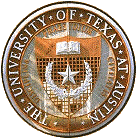
Nanoparticle Research
at The University of Texas in Austin

 |
Laser Spectroscopy and
Nanoparticle Research at The University of Texas in Austin |
 |
|
|
||
Pursue the development and production, by laser ablation of microspheres, of high-performance nanomaterials of gold, silver, permalloy, silicon, and related substances. Pursue studies of the optical properties of these materials. These nanomaterials will be used in electronic applications that utilize the unique properties of metal and semiconductor nanoparticles.
The production of these nanoparticles will use a process we recently invented, called the Laser Ablation of Microparticles (LAM). In this process, a high-energy laser pulse hits a microparticle (~2-20 microns in diameter) and initiates a shock-wave. As the shock passes through the microparticle, it converts a high percentage of the mass to nanoparticles (20-100 nm in diameter. Our objective is to develop the LAM process to collect significant quantities (>100 gm) of nanoparticles and to demonstrate their unique performance in targeted applications:
A continuous flow LAM processor will be used with a high average power excimer laser. The processor consists of buffer/carrier gas and feedstock aerosol sources, a laminar flow laser-interaction region, and a nanoparticle collection apparatus.
For collection, we will use sonic jet impaction in a vacuum. A 200 micron diameter jet accelerates the aerosol to speeds limited by the sonic velocity (300-1000 m/s for Ar or He buffer/carrier gas) and the slip of the accelerated nanoparticles. Sufficiently far downstream, nanoparticles are able to penetrate the boundary layer and impact on the target as the buffer/carrier gas flows around it.
Several interesting options for collection will be explored:
The LAM process will provide a unique source of high purity, non-agglomerated nanoparticles in 100 gm quantities so that potential applications can be developed and demonstrated.
This research, supported by NSF (GOALI project with Dupont
Electronics) and the Texas Advanced Technology Program, is a
collaboration between Professor John W. Keto in the Physics Department,
Professor Mike Becker in the Department of Electrical and Computer
Engineering, and Professor D. Kovar in the Department of Mechanical
Engineering. This research will offer training in laser technology and
materials diagnostics, such as SEM, near field laser spectroscopy, TEM,
and Auger spectroscopy.
If you are interested in obtaining additional information about these research projects contact Prof. John Keto, RLM 10.210, (512)471-5029, or send e-mail to keto@physics.utexas.edu.